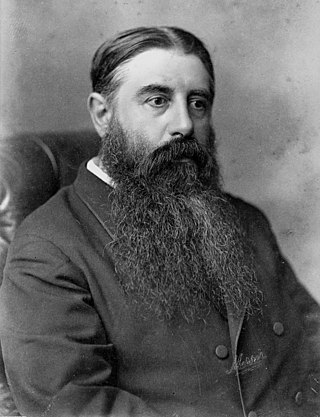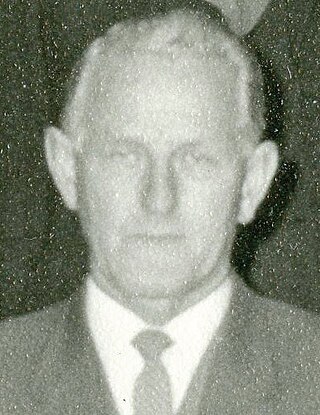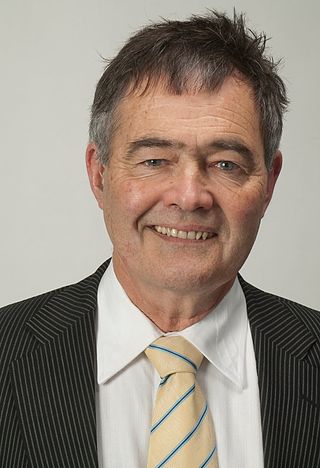Related Research Articles

David Henry Benson-Pope is a New Zealand politician. He is a former Member of Parliament for Dunedin South and has been a member of the Dunedin City Council since 2013.

The 1875–1876 New Zealand general election was held between 20 December 1875 and 29 January 1876 to elect a total of 88 MPs in 73 electorates to the 6th session of the New Zealand Parliament. The Māori vote was held on 4 and 15 January 1876. A total of 56,471 voters were registered.

Thomas Dick was a 19th-century New Zealand politician. Originally a merchant, he worked in London and then represented his firm on Saint Helena for seven years. From there, he was sent to Dunedin as the company's representative; he emigrated with an extended family. He soon became involved in politics and was Superintendent of Otago Province from 1865 until 1867. Over a period of 24 years, he represented various Dunedin electorates in Parliament and was Colonial Secretary (1880–1884), Minister of Justice from 1881 to 1882, and Minister of Education from 1881 to 1884. A deeply religious man, he was involved in many church affairs. He was one of the founders of Hanover Street Baptist Church; the building is now classified as Category I by Heritage New Zealand.

William Downie Stewart was a 19th-century New Zealand politician and a lawyer.
City of Dunedin, during the first two parliaments called Town of Dunedin, was a parliamentary electorate in Dunedin in Otago, New Zealand. It was one of the original electorates created in 1853 and existed, with two breaks, until 1905. The first break, from 1862 to 1866, was caused by an influx of people through the Otago Gold Rush, when many new electorates were formed in Otago. The second break occurred from 1881 to 1890. It was the only New Zealand electorate that was created as a single-member, two-member and three member electorate.

Charles Thomas Ick was Mayor of Christchurch, New Zealand, from December 1878 to December 1880. Born in Shropshire, he learned the trade of a mercer and draper. The Icks had five children when they emigrated to Otago in 1858. He worked in his learned trade in Dunedin for five years before becoming a farmer in Waikouaiti for seven years. In 1870, he came to Christchurch and set himself up as an auctioneer and later opened a drapery business.
The 3rd New Zealand Parliament was a term of the Parliament of New Zealand. Elections for this term were held between 12 December 1860 and 28 March 1861 in 43 electorates to elect 53 MPs. Two electorates were added to this during this term, Gold Fields District and a new Dunedin electorate created by splitting the existing City of Dunedin into Dunedin and Suburbs North and Dunedin and Suburbs South, increasing the number of MPs to 57. During the term of this Parliament, six Ministries were in power.

Samuel Edward Shrimski was a 19th-century Member of Parliament and then a Member of the Legislative Council from Otago, New Zealand.
The 8th New Zealand Parliament was a term of the New Zealand Parliament.
Lee Vandervis is a local-body politician who was first elected to the Dunedin City Council in the 2004 local elections. Vandervis has run for mayor in 2004, 2007, 2010, 2013, 2016, 2019 and 2022; finishing second in 2007 and 2019. Vandervis failed to win mayor again in 2022, but he was re-elected to the Council.

Russell John Calvert was a New Zealand local-body politician. He served as Mayor of Dunedin between 1965 and 1968.

The 2013 Dunedin mayoral election was held on Saturday, 12 October 2013 and was conducted under the single transferable voting system. Dave Cull, Dunedin's 57th mayor, was re-elected after seeing off eight challengers.

The 1876 Christchurch City mayoral election was the first election for the Mayor of Christchurch held by public vote. The election, held on 20 December, was won by James Gapes, who beat fellow city councillor Charles Thomas Ick.

The Christchurch mayoral election held on 27 November 1878 was contested by the incumbent mayor, Henry Thomson, and senior Christchurch City Councillor Charles Thomas Ick. The election was won by Ick with a large margin.
William John Dyer was a New Zealand businessman and politician. Born in London, his family moved to Sydney when he was a child. He ran a trading business between Sydney, New Zealand and the Pacific Islands, and moved to New Zealand in 1857. He lived at different times in Dunedin and Milton and entered politics, contesting a number of elections and representing the Tokomairaro electorate in the provincial council.
The April 1865 Bruce by-election was a New Zealand by-election held in the multi-member electorate of Bruce during the 3rd New Zealand Parliament on 8 April 1865. It was triggered on 9 January that year by the resignation of separationist Thomas Gillies and won by prominent settler Arthur John Burns. The more liberal businessman William John Dyer was the sole other contester of the by-election, finishing with 43.33% of the vote.
Henry Clapcott was a New Zealand businessman and politician.

Aaron Garth Hawkins is a New Zealand politician who served as the 58th mayor of Dunedin, New Zealand from 2019 to 2022. He was elected as Mayor on 12 October 2019 with 54.54% of the vote, after two prior terms as councillor. He is endorsed by the Green Party. He unsuccessfully stood for re-election as mayor in 2022. Hawkins subsequently co-founded a re-wilding project called Floruit.

John Bradley Shacklock was a New Zealand iron founder and politician. He served as mayor of Dunedin from 1914 to 1915.
References
- 1 2 3 "The Election of Mayor". Otago Daily Times . No. 1119. 22 July 1865. p. 4. Retrieved 15 May 2016.
- ↑ "To the Electors of the City of Christchurch". The Star . No. 2713. 8 December 1876. p. 2. Retrieved 13 April 2013.
- ↑ "Municipal Corporations Acts Amendment Act 1875". University of Auckland. 21 October 1875. Retrieved 20 April 2013.
- ↑ "The Election of Mayor". Otago Daily Times . No. 1120. 24 July 1865. p. 5. Retrieved 15 May 2016.